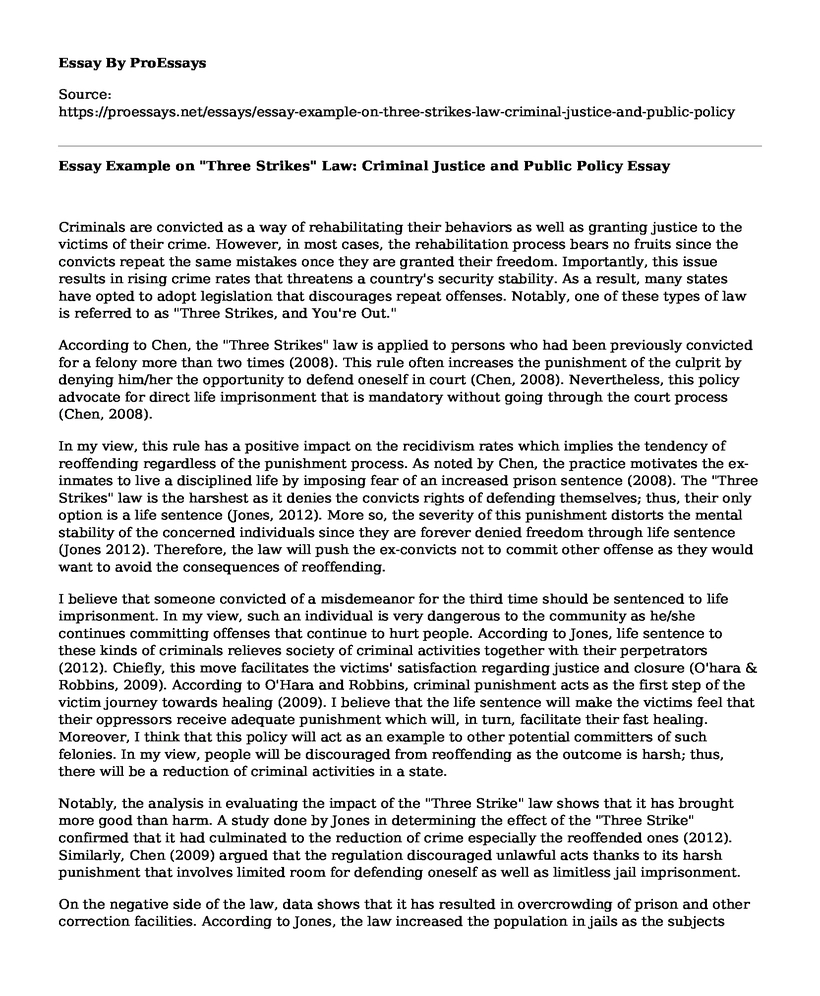Criminals are convicted as a way of rehabilitating their behaviors as well as granting justice to the victims of their crime. However, in most cases, the rehabilitation process bears no fruits since the convicts repeat the same mistakes once they are granted their freedom. Importantly, this issue results in rising crime rates that threatens a country's security stability. As a result, many states have opted to adopt legislation that discourages repeat offenses. Notably, one of these types of law is referred to as "Three Strikes, and You're Out."
According to Chen, the "Three Strikes" law is applied to persons who had been previously convicted for a felony more than two times (2008). This rule often increases the punishment of the culprit by denying him/her the opportunity to defend oneself in court (Chen, 2008). Nevertheless, this policy advocate for direct life imprisonment that is mandatory without going through the court process (Chen, 2008).
In my view, this rule has a positive impact on the recidivism rates which implies the tendency of reoffending regardless of the punishment process. As noted by Chen, the practice motivates the ex-inmates to live a disciplined life by imposing fear of an increased prison sentence (2008). The "Three Strikes" law is the harshest as it denies the convicts rights of defending themselves; thus, their only option is a life sentence (Jones, 2012). More so, the severity of this punishment distorts the mental stability of the concerned individuals since they are forever denied freedom through life sentence (Jones 2012). Therefore, the law will push the ex-convicts not to commit other offense as they would want to avoid the consequences of reoffending.
I believe that someone convicted of a misdemeanor for the third time should be sentenced to life imprisonment. In my view, such an individual is very dangerous to the community as he/she continues committing offenses that continue to hurt people. According to Jones, life sentence to these kinds of criminals relieves society of criminal activities together with their perpetrators (2012). Chiefly, this move facilitates the victims' satisfaction regarding justice and closure (O'hara & Robbins, 2009). According to O'Hara and Robbins, criminal punishment acts as the first step of the victim journey towards healing (2009). I believe that the life sentence will make the victims feel that their oppressors receive adequate punishment which will, in turn, facilitate their fast healing. Moreover, I think that this policy will act as an example to other potential committers of such felonies. In my view, people will be discouraged from reoffending as the outcome is harsh; thus, there will be a reduction of criminal activities in a state.
Notably, the analysis in evaluating the impact of the "Three Strike" law shows that it has brought more good than harm. A study done by Jones in determining the effect of the "Three Strike" confirmed that it had culminated to the reduction of crime especially the reoffended ones (2012). Similarly, Chen (2009) argued that the regulation discouraged unlawful acts thanks to its harsh punishment that involves limited room for defending oneself as well as limitless jail imprisonment.
On the negative side of the law, data shows that it has resulted in overcrowding of prison and other correction facilities. According to Jones, the law increased the population in jails as the subjects were sentenced to life imprisonment (2012). Importantly, high populations cause inadequate resources in the facilities; thus, the rehabilitation process becomes ineffective.
Conclusion
In conclusion, the "Three Strikes" law is an effective way of controlling crime in society. More so, it enables the community to eliminate wicked and immoral people in a lawfully and humane manner. Notably, it depicts a county's determination in eradicating criminal activities.
References
Chen, E. Y. (2008). Impacts of "three strikes and you're out" on crime trends in California and throughout the United States. Journal of Contemporary Criminal Justice, 24(4), 345-370.
Jones, J. A. (2012). Assessing the Impact of" Three Strikes" Laws on Crime Rates and Prison Populations in California and Washington. Inquiries Journal, 4(09).
O'Hara, E. A., & Robbins, M. M. (2009). Using criminal punishment to serve both victim and social needs. Law and Contemporary Problems, 72(2), 199-217.
Cite this page
Essay Example on "Three Strikes" Law: Criminal Justice and Public Policy. (2022, Dec 19). Retrieved from https://proessays.net/essays/essay-example-on-three-strikes-law-criminal-justice-and-public-policy
If you are the original author of this essay and no longer wish to have it published on the ProEssays website, please click below to request its removal:
- Research Paper on Richard Chase: The Vampire of Sacramento and the Dracula Killer
- Essay on Affordable Healthcare Act: Healthcare System Reforms & Overhauls
- Building a Nation: The Creation of Political Parties by George Washington - Essay Sample
- Canada's Democracy: Stable Traditions, Varied Opinions, Political Parties - Essay Sample
- Essay on Texas Judicial System: Keeping the Legislative & Executive Branches in Check
- Essay Example on Inmates' Rights and Challenges in Correctional Facilities
- Free Report Sample on Committee on Privileges & Elections Report on US Elections & Voting Rights







